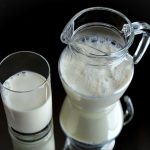Bovine somatotropin (BST), also known as bovine growth hormone (BGH), is a naturally occurring peptide hormone produced by the pituitary gland of cattle. It plays a crucial role in regulating various physiological processes such as growth, metabolism, and lactation. In the dairy industry, BST has garnered significant attention due to its potential to increase milk production in cows. However, the use of BST in dairy farming has sparked debates regarding its safety, ethics, and impact on animal welfare and human health.
BST works by stimulating the growth of mammary glands in cows, thereby increasing milk production. It functions similarly to the naturally occurring hormone produced by cows, but synthetic versions are also available for commercial use. The introduction of BST into the dairy industry has promised significant benefits to farmers, including increased milk yield, improved feed efficiency, and reduced production costs.
One of the primary reasons for the adoption of BST in the US dairy industry is its potential to boost milk production. By administering BST to dairy cows, farmers can increase the efficiency of milk production, leading to higher yields per cow. This increased productivity can result in higher profits for dairy farmers, making BST an attractive option for enhancing the economic viability of dairy operations.
Moreover, BST has been touted as a tool for addressing the growing demand for dairy products worldwide. With a growing global population and increasing demand for dairy products, maximizing milk production efficiency is crucial for meeting consumer needs. BST offers a way to optimize milk production without significantly increasing the number of cows, thereby helping to meet the rising demand for dairy products while minimizing environmental impact.
Additionally, proponents of BST argue that it can contribute to sustainable agriculture by improving resource efficiency. By increasing milk production per cow, BST can help reduce the environmental footprint of dairy farming by lowering the amount of land, water, feed, and other resources required to produce milk. This efficiency can be particularly beneficial in regions where land and resources are limited, allowing farmers to maximize output while minimizing input.
Despite the potential benefits, the use of BST in the dairy industry remains controversial. Critics raise concerns about the welfare of dairy cows treated with BST, citing potential negative effects on animal health and well-being. Some studies suggest that BST administration may increase the risk of health issues such as mastitis, lameness, and reproductive disorders in cows. Furthermore, the increased metabolic demands placed on cows treated with BST could lead to stress and discomfort, raising ethical questions about the use of hormones to manipulate animal physiology for human benefit.
In addition to animal welfare concerns, there are also questions about the potential impact of BST on human health. While regulatory agencies such as the Food and Drug Administration (FDA) have approved the use of BST in dairy cattle, some consumer advocacy groups and scientists have raised concerns about the safety of consuming milk from BST-treated cows. Although numerous studies have been conducted to assess the safety of BST, there is ongoing debate about its potential effects on human health, including its possible role in promoting insulin-like growth factor 1 (IGF-1) in milk, which has been linked to certain health risks such as cancer.
Furthermore, the use of BST in dairy farming has raised broader questions about the sustainability and ethics of modern agricultural practices. Critics argue that relying on hormone supplementation to boost milk production is a short-term solution that may exacerbate long-term environmental and health issues. Instead, they advocate for more holistic and sustainable approaches to dairy farming, such as pasture-based systems and organic production methods, which prioritize animal welfare, environmental stewardship, and consumer health.
In response to public concerns and market demands, some dairy producers have chosen to refrain from using BST in their operations, opting instead for alternative production methods that emphasize natural and organic practices. Additionally, regulatory measures and labeling requirements aimed at informing consumers about the use of BST in dairy products have been implemented in some regions to provide greater transparency and choice.
In conclusion, bovine somatotropin (BST) has emerged as a controversial topic in the US dairy industry, with proponents touting its potential to increase milk production and improve farm efficiency, while critics raise concerns about its impact on animal welfare, human health, and the environment. While BST continues to be used in some dairy operations, the debate surrounding its use underscores broader questions about the sustainability, ethics, and safety of modern agricultural practices. As consumer awareness and demand for transparent and sustainable food production continue to grow, the future role of BST in the dairy industry remains uncertain.


Leave a Reply